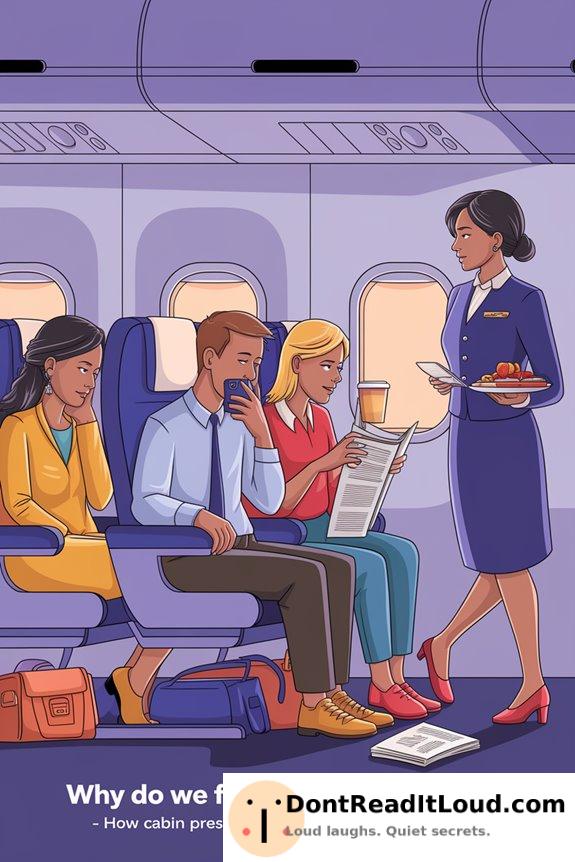
You fart more on airplanes because the lower cabin pressure at high altitude causes gas in your intestines to expand. This puts extra pressure on your gut, making you more likely to pass gas. Digestion can also slow down due to altitude and dry cabin air. Eating processed airplane meals and sitting still for long periods can make things worse. Stress and swallowing more air than usual may also contribute. There are several reasons behind this surprisingly common travel issue.
The Science of Flatulence: What Causes Gas?

Whether you realize it or not, your body constantly produces gas as a natural part of digestion. When you eat, digestive enzymes break down food and release gases such as nitrogen, carbon dioxide, methane, and hydrogen.
The types and amounts of these gases depend on your diet and how well your enzymes function. Foods high in fiber or certain sugars can boost gas production because your body can’t completely digest them.
Bacteria in your gut then ferment these undigested parts, making even more gas. This can cause pressure or the need to pass gas as your body handles it.
How Cabin Pressure Affects Your Digestive System

The gases produced during digestion respond to environmental changes, especially at high altitudes.
On a plane, lower cabin pressure causes your digestive system to slow down. This makes digestive enzymes less effective, which leads to slower food breakdown and more gas accumulation.
Dry cabin air also dehydrates your mucous membranes and can further hinder digestion. As a result, intestinal gases have fewer ways to escape or be absorbed, leaving you feeling bloated and increasing the urge to let out trapped air.
The Role of Altitude in Gas Expansion

When you fly at cruising altitude, the cabin air pressure is like being on a 6,000 to 8,000-foot mountain.
This shift affects how gases behave inside your body. With lower pressure, gas in your intestines expands more than it does at sea level.
Even a small amount of trapped air can quickly become uncomfortable because of these altitude effects. Your body releases this expanded gas—often as a fart—to relieve the pressure.
Why Airplane Food Makes a Difference

Because airplane food is often highly processed and low in fiber, your digestive system struggles to break it down efficiently.
Meals offered onboard are usually chosen for convenience and long shelf life, not for easy digestion. The high levels of salt, sugar, and preservatives can slow your gut activity.
These ingredients may ferment more in your intestines, which leads to increased gas production. With few fresh fruits and vegetables, there’s less fiber to help keep digestion regular.
The Impact of Reduced Mobility During Flights

As you spend hours seated in a cramped airplane, your body’s natural movement slows, leading to sluggish digestion.
Tight seats make it hard to stretch or move around. Limited movement reduces circulation, which can weaken your digestive system.
When your intestines are less active, gas can build up and cause bloating. Without the help of gravity or regular activity, digestion slows even more.
This is why you often feel gassy and uncomfortable during a flight.
Stress and Anxiety: Hidden Contributors to Gas

Even if you don’t realize it, flying can trigger stress and anxiety, both of which can subtly disrupt your digestive system.
When you feel anxious, your body releases stress hormones like cortisol. This can slow down digestion and cause gas to build up in your gut. Nervousness can also make you swallow extra air, especially during takeoff or turbulence.
If you don’t manage your anxiety, these factors can combine and leave you feeling bloated or gassy during your flight. Your emotions in the air play a bigger role in mid-flight gas than you might expect.
Strategies Airlines Use to Manage Cabin Air Quality

While you might focus on your own comfort during a flight, airlines are constantly working to ensure cabin air stays fresh.
Modern aircraft use advanced filtration systems to remove bacteria, viruses, and unpleasant smells, including those caused by increased flatulence.
Cabin ventilation is essential, as it continuously circulates and replaces much of the air every few minutes.
By pairing powerful filters with steady airflow, airlines help keep odors minimal and air quality high.
Tips for Reducing Flatulence While Traveling

Whether you’re a frequent flyer or just planning a single trip, you can take simple steps to minimize gas and avoid discomfort mid-flight.
Begin by adjusting your diet before you travel—avoid carbonated drinks, beans, and high-fiber foods that often cause gas.
Opt for smaller, lighter meals to ease your digestion.
Drink plenty of water, but sip slowly to prevent swallowing excess air.
During the flight, try slow, deep breaths to help with digestion and reduce swallowed air.
Take occasional walks up and down the aisle to improve digestion and relieve any pressure.
A little meal planning and mindfulness can make your journey much more comfortable.
Embracing the Human Side of Air Travel

Although flying can feel impersonal, it’s worth remembering that everyone on board shares similar human experiences—including needing to pass gas at times.
While traveling, you’re surrounded by people all looking for comfort and coping with the quirks of being human.
Feeling embarrassed is natural, but recognizing this shared reality can help you relax.
Instead of worrying, try to make the journey comfortable for yourself and those around you.
Empathy helps more than you might expect.
Conclusion
Next time you’re feeling unusually gassy on a flight, remember it’s a common experience. Pressure changes, altitude, certain foods, and even stress all contribute. While this is a normal part of flying, there are ways to reduce discomfort. Drink plenty of water, stretch your legs, and be mindful of what you eat. It’s simply one of those odd things we all share when we travel by air.



